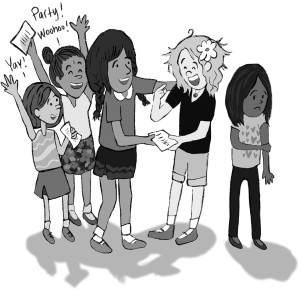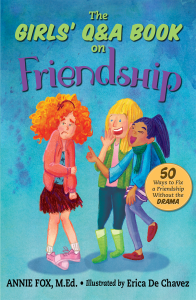|
|
January 7, 2015
 “Why did you make this for dinner!” When children reach a certain age, they will, if we’ve encouraged them to do so, voice their opinions. That’s very healthy and should be encouraged. But sometimes this opinion-sharing turns into a constant barrage of complaints. That can pollute family life. So tell the truth, do your kids complain a lot?
Some folks look at protestors as “complainers.” I disagree. The goal of well-intentioned protestors is to work for more equality, justice, safety, and sanity in the world. All good things, right? That’s why we need our protestors and should join them whenever we feel the urge to support a cause. Complainers, on the other hand, are typically motivated by ego and jealousy. We don’t need more of that.
The following is an excerpt from my book Teaching Kids To Be Good People. If you’d like less complaining from your kids this year, read on…
There is an important concept at the foundation of Jewish tradition known as tikkun olam (repairing the world). It refers to going out of one’s way to make things better for others. Good people are doers, repairers of the world. Complainers have a lot of negative things to say, but they are rarely people of positive action. Making our children more aware of complaining vs. helping encourages them to do good.
Fuel for Thought—When you personally feel something isn’t OK, how do you usually respond? Are you more likely to take direct action or complain? Remember that you are modeling for your children the behavior you want to see in them. Think about the people you know who are (or were) “complainers”? What is it like to be with those people? How is your mood and attitude affected by being around a complainer vs. someone who addresses problems with a positive attitude?
Conversations That Count—Talk with your child about the amount of complaining in the family. (No need to single out any individual, because we all do it at times.) Some complaints point to things can be changed. but most complaints aren’t helpful because they refer to situations that can’t be changed. (“This math assignment is too long!” “Why did I get her for a sister?”) Ask your child to “play back” complaints s/he regularly hears from you. Then you play back complaints you regularly hear from your child. (It’s fine to get silly. Humor is a great way to make it easier to speak the truth.) How much of the grumbling and whining amongst family members has become a bad habit with no real intention toward making things better? What might the family do about that?
Teach—Assuming everyone wants less complaining/nagging, challenge each member of the family to catch himself/ herself (not anyone else) in the act of complaining. Instead of complaining about someone or something:
- Communicate directly about what needs to be done.
- Skip the complaining, and do some or all of whatneeds to be done (on your own).
- Change what you can change, and change yourattitude about the rest.
Have a family meeting next week to discuss the progress the whole family has made in creating a more positive atmosphere.
As always, your comments are warmly welcomed on this blog. Happy New Year!

December 24, 2014
 Some things you never forget My mother, Martha Scolnick Larris, died on Christmas Eve. Tonight I’ll light the yahrzeit lamp to mark the anniversary of her passing. The same lamp she used to honor her parents’ memory. I guess some day my children will light it for me. Lovely Jewish tradition.
1994. It’s been twenty years. My relationship with my mother was often contentious and frustrating and hurtful. As much for her as it was for me, I’m sure. Takes two to tango. But we also had fun together. And there was much about her that I loved and admired including her love of books, her impressive vocabulary and quick wit, her instant rapport with every child she encountered, her self-reliance and her sense of fairness. She was a whiz at canasta and bridge and absolutely unbeatable in Scrabble. Also, my mom had a dynamite smile which you can see in this photo at the right.
I think of her often while I’m in the kitchen. I still have her coffee pot and her ice cream scoop. I still make her meatloaf, her sweet potato and marshmallow casserole, her banana chocolate chip cake. But it’s in the garden, when I marvel at my gladiolus or smell the lilacs that she comes to me most. The fact that I have a garden which gives me so much pleasure is a direct result of being my mom’s daughter. Let me tell you, that woman knew her flowers. And because of her, so do I. And so does my daughter.
 This iris grows in my garden because my mom had them in hers. Maybe it seems a small thing to know a freesia from a forsythia, a hydrangea from a hyacinth. And who really cares if those iris bulbs I got from my neighbor seem bluer this year than ever? I care. I can’t help it. This special awareness of plants provides me… no compels me to pay attention and celebrate color, light, form and fragrance. If I saw them all as “just flowers” I’d be missing most of the show and I certainly wouldn’t be taking photos of them every chance I get. Appreciating beauty at that level ain’t small potatoes. So thank you, Mom.
I know all moms are not always a positive influence on their children. People, including our parents, come into our lives for a reason. But even in a less than wonderful childhood there are positive lessons. Take a moment and think about those lessons. They are gifts you’ve received. Now think about the legacy you’re giving to your children. Hopeful it’s a life-affirming one.
Your comments, as always, are welcome.

December 22, 2014
Just started blogging for Huffington Post. Long time goal on my bucket list… check! I haven’t been at it for long, so you haven’t missed much. If you’d like to catch up, here’s where you can subscribe to my RSS feed and/or read the three articles I’ve posted so far.
Since I’m starting this gig during the holiday season, I’m seasoning my posts with holiday spirit. Like this one, from today: This Holiday Season Have Compassion for Relatives Who Drive You Nuts.
It’s a little funny and a little serious. Bottom line, we’ve all got folks in our extended family who can push our buttons like all get-out. (Not sure where that expression comes from but I’ve always liked the sound of it.) Don’t know about you, but when I get my chain yanked I’m at least as unpleasant as the aforementioned button-pushers. No fun for me or anyone else. So in this post I give tips for turning irritation into compassion. Why? So you (and I) can spread a little love in Aunt Gertrude’s direction while teaching our kids that there are times when we all need to put on our ‘company manners’ and be pleasant to everyone.
 Time to get together with the family… Go ahead, read it and you just might have a happier holiday. I hope so!

December 20, 2014
T’is the season for parties. When it’s a family affair, all the kids are included. But as you get older, you may want to organize your own get-togethers, and that means only “special friends” get invited. If you’ve been left off a party invitation list you might have felt left-out. But what if you were invited to a party and one of your besties wasn’t? Awkward situation!
This question comes from a girl who found herself in that situation. Her question and my answer are included in my latest book, The Girls’ Q&A Book on Friendship: 50 Ways to Fix a Friendship Without the DRAMA. Read on…
 “I got invited, but my friend didn’t! Awkward!”
Q: “Friend A invited everyone to her party except Friend B. Now Friend B is mad at me for wanting to go. But I need to go so I can be popular. Is it worth it?”
Answer: If understand that you want to go to the party, but if everyone was invited except Friend B, you can understand why she is upset. Maybe you can also understand why she is angry that you want to go without her.
When you say, “I need to go to the party so I can be popular,” I wonder if the Popularity Game means more to you than Friend B. People who ditch friends to be with more “popular” people often find themselves without any real friends.
Should you go to the party? Good question! If you do, then Friend B will probably be unhappy with you. She might get over it, but there is also a chance that your going to the party could really damage the friendship. You are the only one who can decide if it’s “worth the risk. To help you figure it out, think about this: If Friend B go invited and you didn’t, how would you feel about her going with you? If it wouldn’t feel right for her to go, then it’s probably not right for you.
_______
If you’re curious about the 49 other questions and answers in The Girls Q&A Book on Friendship, check out this free excerpt. If you’ve got a friendship challenge you need help with right now, email me or post it to the comments below.
 50 Ways to Fix a Friendship without the DRAMA
 — Older Posts »
| |

















